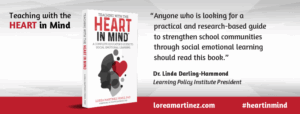Our recent Learn with the Expert session featured Dr. Lorea Martínez, an educator and the founder of HEART in Mind Consulting, a company dedicated to helping schools and organizations integrate Social Emotional Learning (SEL) in their practices, products, and learning communities.
A healthy school community starts with happy and healthy teachers! When educators aren’t at their best, their students aren’t able to thrive. Recently, many teachers have left the profession for a variety of different reasons, including stress. When experienced for an extended period of time, as many educators have, stress impacts their ability to achieve their best work, bleeds into the overall feeling of their classroom, and can worsen burnout.
In this Learn with the Expert webinar, Martínez explores actionable ways to support teachers’ social and emotional needs through planning, professional development, and trauma-informed self-care tools so that educators are able to feel supported, confident, and prepared for success.
It’s no secret that the Covid-19 pandemic has impacted kids’ mental health as children experienced higher levels of grief, anxiety, and depression. In fact, according to the National Center for Education Statistics as of July 2022, more than 80% of US public schools report the pandemic has negatively impacted student behavior and socio-emotional development. Similarly, Covid-19 has impacted teachers’ mental health leading to a variety of problems. Educators are having to solve issues such as staff shortages, limited budgets, low morale, high pressure, resistance from the community, and more. Martínez notes that because of this, the need to support our teachers’ social and emotional capacity through Social Emotional Learning (SEL) has become even greater.
In her book, Teaching with the Heart in Mind Martínez shares that “educational systems need to invest in creating systemic and systematic SEL initiatives that include supporting the HEART skills of educators and staff working with children and youth.” Here, issues arise because the reality is that SEL requires whole-school implementation to support the learning and wellbeing of every educator which is understandably easier said than done. As a way to help create healthier school communities, Martínez shares five strategies to develop educator wellbeing that may seem simple but yield particularly important and beneficial results.
1. IDENTIFY NEEDS
Martínez talks through the idea of collecting and analyzing data about staff current social and emotional needs, then problem solving ways to remedy this. This process begins by asking teachers what do you need? Teachers aren’t able to feel supported and safe unless their administration knows what they need from a socio emotional perspective.
2. REMOVE BARRIERS
Once the administration knows what their teachers need, they must go a step farther and remove the barriers that keep teachers from achieving this goal. By using data to streamline school structures, routines, and expectations, schools are able to remove these barriers and perhaps even find better ways to complete tasks.
3. STRENGTHEN RELATIONSHIPS
Establish space and time for staff to come together with the goal of strengthening their relationships, and problem solve together ways to build a healthy school community. Trust falls at the heart of these relationships and allows them to thrive, but these feelings don’t develop overnight—they are a group effort that must be built over time.
4. SUPPORT ADULT SEL DEVELOPMENT
Support and allow educators and teachers to develop their own social and emotional skills in a developmentally appropriate and respectful way. It’s important to remember that every adult has their own process that allows them to personally be as successful as possible. When thinking of ways to support educators in this way, creativity can often be key.
5. EXAMINE HOW YOU LEAD

Martínez closes the session by sharing that educators need to feel safe, supported, and seen in order to stay in the profession. Healthy teachers are critical to healthy school communities—it’s time we invested in the mental and socio emotional wellbeing of our educators.
 FOR MORE, WATCH LEARN WITH THE EXPERT WITH LOREA MARTINEZ
FOR MORE, WATCH LEARN WITH THE EXPERT WITH LOREA MARTINEZ
Learn with the Expert: Creating Healthy School Communities Through Teacher Wellbeing with Lorea Martinez
Martinez discusses how schools can support teachers mental & emotional well-being in the classroom


 FOR MORE, WATCH LEARN WITH THE EXPERT WITH LOREA MARTINEZ
FOR MORE, WATCH LEARN WITH THE EXPERT WITH LOREA MARTINEZ

